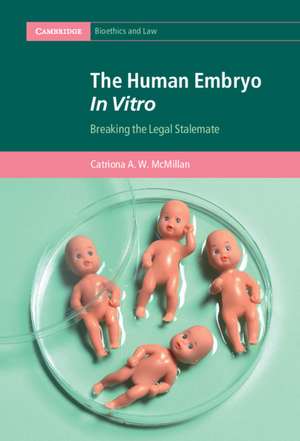The Human Embryo In Vitro: Breaking the Legal Stalemate: Cambridge Bioethics and Law
Autor Catriona A. W. McMillanen Limba Engleză Hardback – 31 mar 2021
Din seria Cambridge Bioethics and Law
-
 Preț: 229.28 lei
Preț: 229.28 lei - 5%
 Preț: 218.32 lei
Preț: 218.32 lei - 11%
 Preț: 695.06 lei
Preț: 695.06 lei -
 Preț: 217.84 lei
Preț: 217.84 lei -
 Preț: 185.26 lei
Preț: 185.26 lei -
 Preț: 237.15 lei
Preț: 237.15 lei -
 Preț: 496.78 lei
Preț: 496.78 lei - 9%
 Preț: 662.42 lei
Preț: 662.42 lei - 11%
 Preț: 638.35 lei
Preț: 638.35 lei - 5%
 Preț: 269.97 lei
Preț: 269.97 lei - 5%
 Preț: 309.71 lei
Preț: 309.71 lei -
 Preț: 283.63 lei
Preț: 283.63 lei -
 Preț: 281.67 lei
Preț: 281.67 lei - 14%
 Preț: 727.26 lei
Preț: 727.26 lei -
 Preț: 279.76 lei
Preț: 279.76 lei - 14%
 Preț: 727.26 lei
Preț: 727.26 lei -
 Preț: 317.49 lei
Preț: 317.49 lei - 11%
 Preț: 639.10 lei
Preț: 639.10 lei - 14%
 Preț: 727.26 lei
Preț: 727.26 lei - 14%
 Preț: 726.42 lei
Preț: 726.42 lei -
 Preț: 403.84 lei
Preț: 403.84 lei - 14%
 Preț: 783.67 lei
Preț: 783.67 lei -
 Preț: 280.53 lei
Preț: 280.53 lei - 14%
 Preț: 699.45 lei
Preț: 699.45 lei -
 Preț: 339.96 lei
Preț: 339.96 lei - 5%
 Preț: 800.63 lei
Preț: 800.63 lei -
 Preț: 284.78 lei
Preț: 284.78 lei - 14%
 Preț: 785.17 lei
Preț: 785.17 lei - 5%
 Preț: 265.22 lei
Preț: 265.22 lei -
 Preț: 287.28 lei
Preț: 287.28 lei -
 Preț: 291.26 lei
Preț: 291.26 lei -
 Preț: 284.39 lei
Preț: 284.39 lei
Preț: 723.92 lei
Preț vechi: 841.77 lei
-14% Nou
Puncte Express: 1086
Preț estimativ în valută:
138.52€ • 144.63$ • 114.64£
138.52€ • 144.63$ • 114.64£
Carte tipărită la comandă
Livrare economică 04-18 aprilie
Preluare comenzi: 021 569.72.76
Specificații
ISBN-13: 9781108844109
ISBN-10: 1108844103
Pagini: 224
Dimensiuni: 235 x 160 x 20 mm
Greutate: 0.5 kg
Editura: Cambridge University Press
Colecția Cambridge University Press
Seria Cambridge Bioethics and Law
Locul publicării:Cambridge, United Kingdom
ISBN-10: 1108844103
Pagini: 224
Dimensiuni: 235 x 160 x 20 mm
Greutate: 0.5 kg
Editura: Cambridge University Press
Colecția Cambridge University Press
Seria Cambridge Bioethics and Law
Locul publicării:Cambridge, United Kingdom
Cuprins
Introduction; Part I. Into Liminality: 1. The evolution of 'the embryo' in law: a matter of process?; 2. 'The embryo' in law today: the human fertilisation and embryology act 1990 and beyond; 3. From process to purgatory: moving beyond legal stasis; Part II. Through Liminality: 4. Navigating legal purgatory: the otherness of embryos; 5. A liminal lens; Part III. Out of liminality: 6. A context based approach; 7. Looking forward: the 14-day rule, in vitro gametogenesis, and ectogenesis; Conclusion; Bibliography.
Recenzii
'Offering a strikingly fresh perspective on the regulation of human embryos, this valuable new book argues persuasively that the law's attempt to ascribe a single fixed status to 'the embryo' is destined to fail, and that we should acknowledge instead the fluid, context-specific and essentially liminal nature of human embryos in vitro.' Emily Jackson, Professor of Law, The London School of Economics and Political Science
'Using two innovative lenses - liminality and the gothic - in this book McMillan addresses the place and construction of 'the embryo' in law. Her penetrating socio-legal analysis draws on the science and technology studies and anthropological literatures to persuasively argue that there is no singular 'embryo' in law, but instead multiple (unacknowledged) ones. Her incisive analysis emphasises the significance of thresholds, boundaries, and processes for understanding law and legal gaps regarding these. She insists that it is 'time to break the legal stalemate surrounding embryos in vitro'. The book is a call to arms - for both regulators and legal scholars - to take context and process seriously. Readers will be left in no doubt that this is a call we should all heed.' Muireann Quigley, Professor of Law, Medicine, and Technology, Birmingham Law School
'Using two innovative lenses - liminality and the gothic - in this book McMillan addresses the place and construction of 'the embryo' in law. Her penetrating socio-legal analysis draws on the science and technology studies and anthropological literatures to persuasively argue that there is no singular 'embryo' in law, but instead multiple (unacknowledged) ones. Her incisive analysis emphasises the significance of thresholds, boundaries, and processes for understanding law and legal gaps regarding these. She insists that it is 'time to break the legal stalemate surrounding embryos in vitro'. The book is a call to arms - for both regulators and legal scholars - to take context and process seriously. Readers will be left in no doubt that this is a call we should all heed.' Muireann Quigley, Professor of Law, Medicine, and Technology, Birmingham Law School
Notă biografică
Descriere
Proposes that the human embryo in vitro is in a unique 'legal stasis' between potential person and useful research artefact.
